How to Live (almost) Forever
How to live (almost) forever… “I can't stand it to think my life is going so fast and I'm not really living it."
"Nobody ever lives their life all the way up except bull-fighters."
Robert Cohn and Jake Barnes in chapter 2 of "The Sun Also Rises" by Ernest Hemingway
-----------------------------
We have been trained since children to view time as linear – that it plods along like a metronome – ticking predictably forward into the future, tocking consistently backward into the past. This is a myth, a lie, and it matters…
I am dying. Like you, I have a terminal disease called “life,” that, assuming it runs its normal course, will result in my death in roughly 41 more years according to actuarial tables of an American male my height and weight.
"Every man dies, not every man really lives." - William Wallace in Braveheart
Coincidentally, I am 41 years old, so this means that my life is nearly exactly half over as the math goes. But for most people, time begins to assume an ever accelerating pace – a summer from our childhood casts the same shadow on our memories as young adult’s year, which starts to feel remarkably similar to a whole decade by middle age. Assuming this logarithmic scale continues, my life as measured by a sense of the passage of time and the depth of my memories may already be 80-90% over. But it doesn’t have to be this way…
I have concluded that despite logic, intuition, and what we have been taught, time is flexible – and that the sense of time, as tracked and measured by our brains, can be created and expanded or condensed and squandered.
Are you “killing time” or are you “making time?”
“Wait,” you say, “What are you talking about? Measurement of time is linear – isn’t it based on some oscillating electrons somewhere in Colorado? Are you talking physics? Don’t tell me you are talking metaphysics?”
I’m discussing neither. I’m talking about practical, everyday life and the real sense of time and how it passes. To prove time is flexible, let me walk you through two examples.
First, imagine, that you are trapped in a small room where your job, day after day, is to enter a series of randomly generated strings of letters, numbers and symbols into a monochrome computer screen. You sit there, hour after hour, reading the string of numbers off an endless stack of papers, typing them slowly, complete with mistakes and backspaces and corrections onto the screen, losing your place almost every time, and then you review and double review for accuracy, before finally pushing “enter”, whereupon the flashing code disappears, and then you type the next 30 - 50 digit letter and number combination.
The string of letters and numbers begin to tumble and blur as the flashing pixels start to whisper their sibilant confusion to your brain, a foreign language which your mind tries and fails to translate into the keystrokes your fingers peck. The “check digits” algorithm causes the computer to reject your entries as often as they are accepted, which also proves your inability to accurately remember more than about 10-15 letters and numbers in combination.
As you can imagine, while performing such a mind numbing repetitive task alone, each hour begins to stretch on for an eternity, each minute expanding, bloating with the boredom, the tedium, the lack of purpose. After a while, the ticking of the second hand on the clock starts to slow, and as your eyes twitch watching it tick, you realize that time has nearly stopped… A half a day and an eternity later, you emerge and return to your dorm room to begin studying for a physics exam, trying to make sense of yet another grouping of seemingly random symbols. (This, by the way was my college job – entering the long strings of periodical codes for the thousands of obscure journals into the ‘green screen’ of the school computer at Stanford’s Green Library “Stacks”.)
I worked at Green Library for an entire year, and no, I don’t have a single picture of the ½ year of my waking life that I spent there…
Contrast this with another scenario. It is a Friday morning and you have just arrived to work full of manic energy. You have a huge list of “to-do’s” for the day, because on that afternoon, after a half day of work you are flying south to the beach, or driving up north, or heading west for vacation. You slate ½ hour for your first task and are horrified when you look up and find 25 minutes gone – in what seemed to be the equivalent of 3 seconds. The hands race around the clock and you race with them, checking off items from your list as the time to departure evaporates. Seemingly 5 minutes after you arrive (but actually 5 hours later) it is time to go and you run for the elevator… Then, perhaps you forget your tickets, or you run out of gas, or you go to the wrong terminal, or your daughter throws up in the security line – (it seems it is always something) but a few hours later, you manage to arrive at the resort or cottage or campsite, explore your room, go for a hike, walk down to the beach, have a cocktail, watch the sunset, have an amazing dinner, take an evening swim, have a great conversation, read a few chapters of a great book – whatever and…yet…somehow the day seems to be over as quickly as the ephemeral and fabled “green flash” of sunset over the water…
If you are like me, by now you’ve taken a dozen or a hundred pictures – here’s one from a recent canoe camping trip with my daughter – I caught her tossing golden sand in the golden sunset for a “golden moment.”
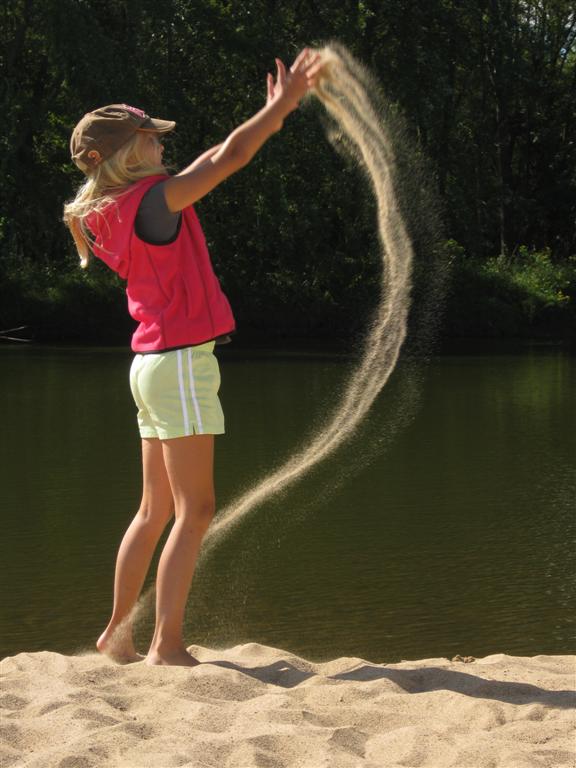
Both of these examples include about 12 hours of linear time… But in the perception of the conscious mind (the part that lives in the present), the first scenario initially felt like an eternity and the second initially felt like a fleeting moment in time…
Now here’s where it gets interesting. Contrast the real-time experience of the ‘eternity’ and ‘fleeting moment’ scenarios with the subsequent memories of those two periods a month or a year later when they have become part of your “temporal past.” Odds are good that the 12 hours of the first example (typing numbers & letters) disappears altogether leaving no trace in the software of our brains and hence takes up no actual memory time (in contrast to the “eternity” it was in the present). Is it fair to say that except for its role in enabling the second scenario that that time was lost?
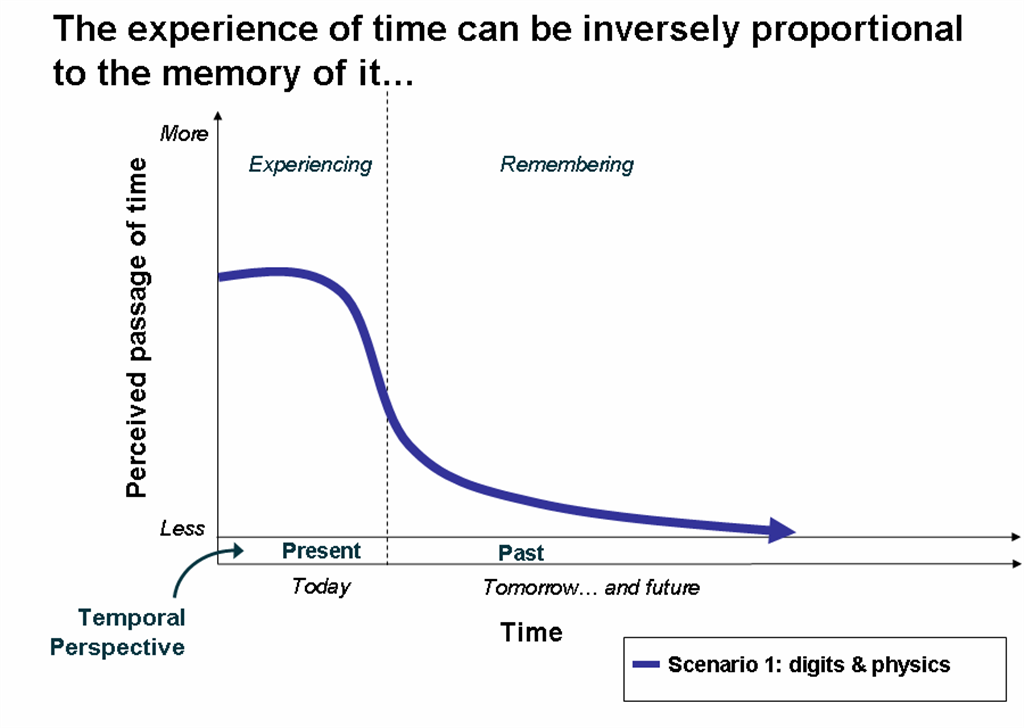
The second example, however, leaves more than just a trace in our mental hard drive. Despite its fleeting presence in-the-moment, this day and evening, as is often the case the first day of a vacation, likely contained some unique and memorable events, and its share of memory has expanded significantly from the mental blip it started from.
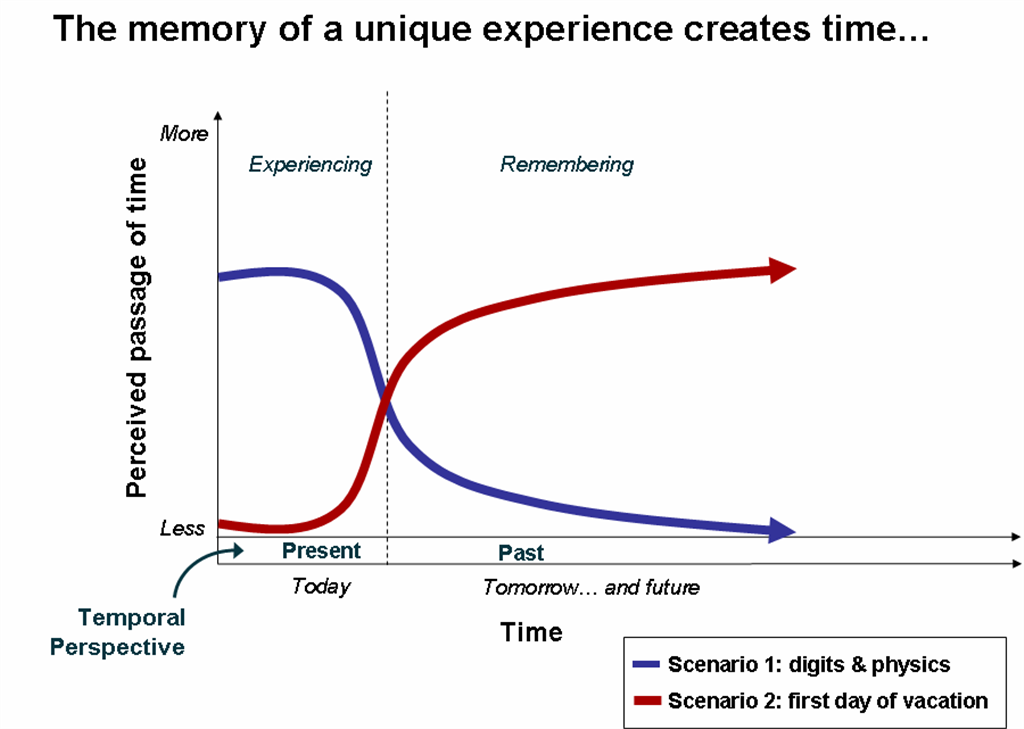
Lets add one more wrinkle – if perceptive time has three main elements - present, past, and future, then these vignettes continue their odd juxtaposition when viewed from the “future temporal state.” The vacation most likely consumed a great deal of future anticipation or of a mindset in the ‘future temporal state’, whereas the mundane day of work at the library followed by study was again a complete cipher – a zero in the future temporal state.
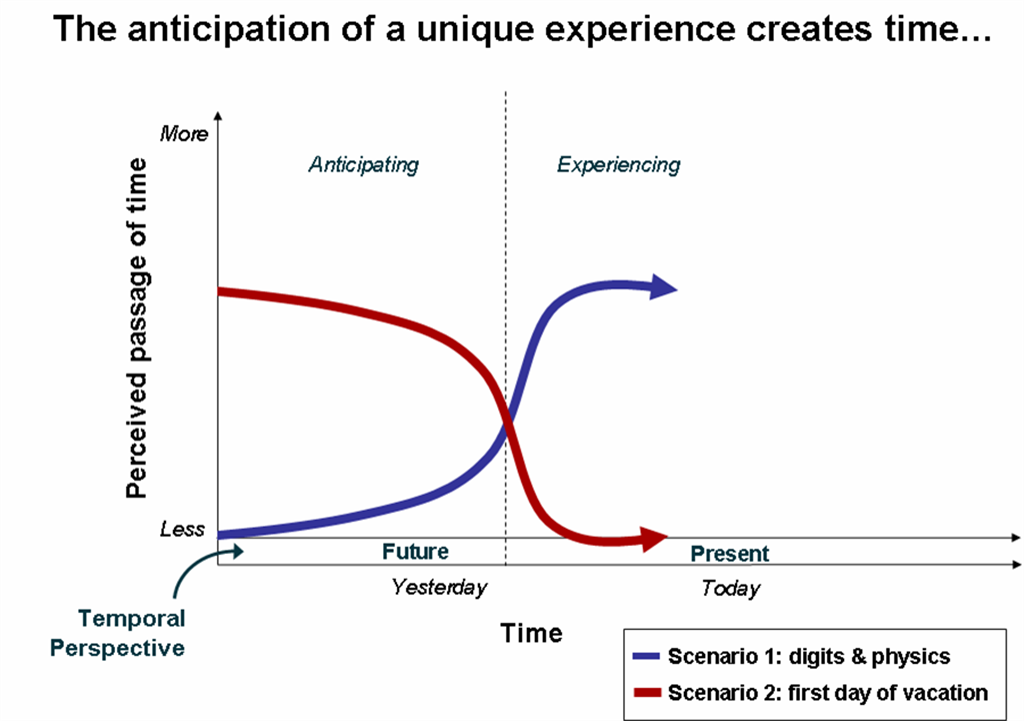
So what does it all mean?
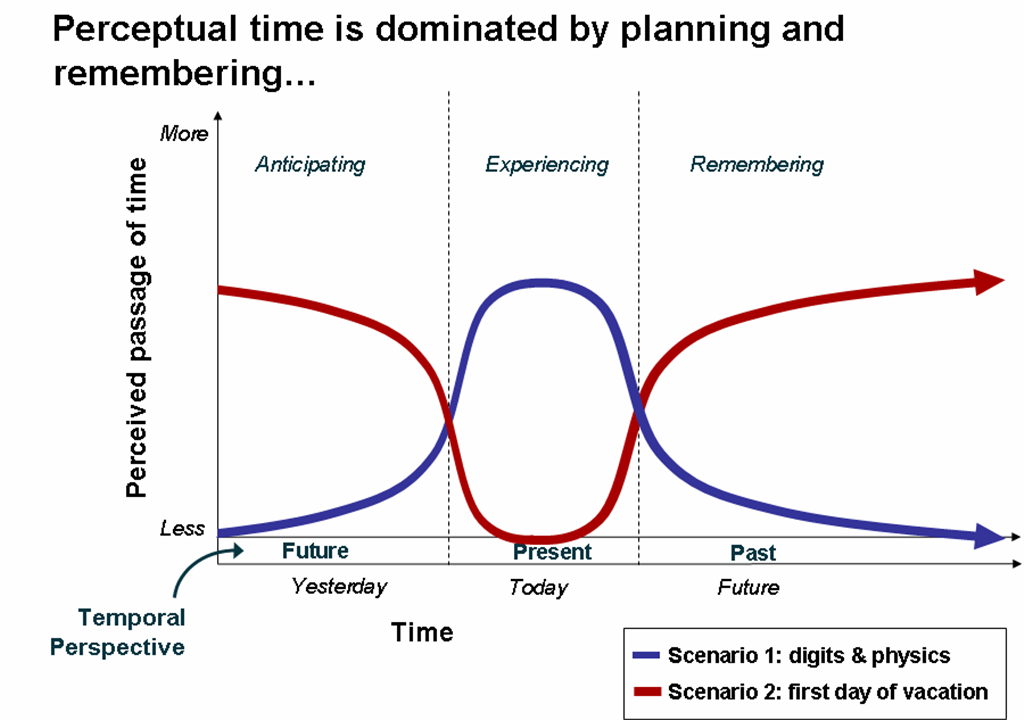
It means that time is flexible – that the perception of time and hence of life can be expanded or contracted, and, to take it one step further, that it might be quite possible to design a life, to design a set of experiences to expand time, and hence to really live longer.
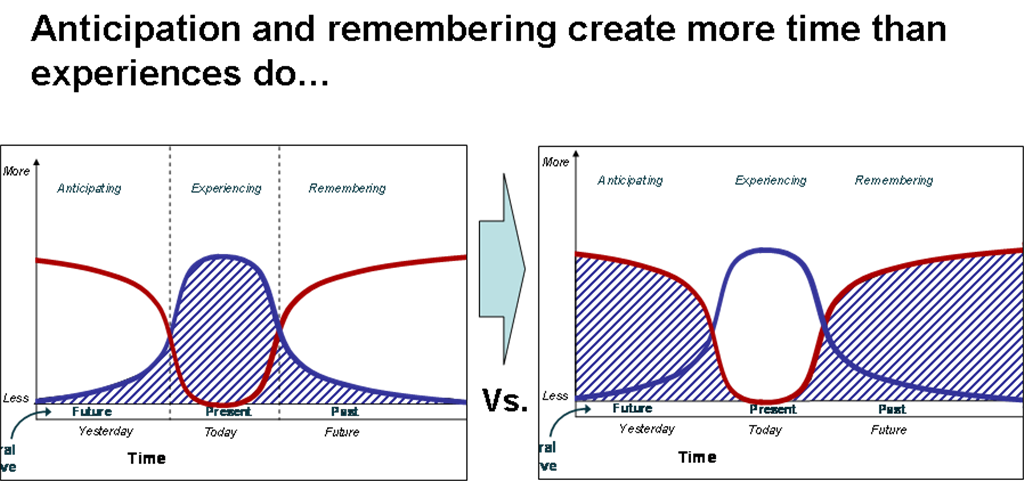
If we are mental and spiritual beings, if time is truly relative, if the measure of a lifetime is the sum of its perceived time here on earth which is a function of our plans, experiences, and memories, then we owe it to ourselves to maximize the perception of time. In particular, we owe it to ourselves to plan for experiences that create the most memories.
Let me say it again – we should plan experiences that create the most memories.
I call these moments that expand time, “really living.”
Here’s a question – is it possible to “live” more in one day (say, on vacation, or doing something you love) than in a week doing something meaningless or unimportant? Are there certain days you have experienced that you would trade for a week of doing something else?
Let’s take it further – is it possible to live and create more memories in an afternoon, than in a whole month of a boring repetitive, mundane task or situation?
If so, then is it at least remotely possible, at the extreme, to experience enough in one shining supernova of a minute to equal the memories an entire year? Is there a certain moment in your life that you would trade a year of mundane living for?
I have lived the value of a year in one minute. Sadly, I have also lived the value of a minute in one year, probably more than once in my 41 years here on earth.
One last twist to this tale….What is it that makes a week - a day - an hour - a minute, full of life giving memories? It is not, as one would assume, necessarily always a positive, uplifting experience. It is not always, “golden moments.” One of my most significant memories is the several hours I spent at risk of hypothermia on a cold rainy and empty stretch of the autobahn in southern Germany while hitchhiking across Europe. I was miserable. I was terrified. I ended up stripping naked in an empty field, putting on dry spandex racing suits and burying myself in a pile of hay to survive.
I survived (this part is important). And the memory of those hours is almost as real today as the present reality those moments were 19 years ago.
Consider this possibility: if it were possible to live a year in a minute, what if you could create a string of “year-long minutes” in your life? How many “years” could you then live? If I could create 10 year-long-minutes each year for the rest of my life, that would be 410 years of “really living.” If this concept of the flexible nature of time is true, if time can be “created” then it seems possible that the fountain of youth, the sorcerers stone, ancient alchemy are not only approachable, but practical given how our brains process time.
So, how is it possible to expand life, to stretch time, to “live (almost) forever”? My intention is to document strategies for doing exactly this in future posts. In the meantime, some thoughts about the role of “stories” in creating time:
That perfect trip? That first kiss? Getting lost in a Moroccan Souk? Making the team? Losing a close one? Teaching your daughter to snorkel? Missing the train and racing to the next train station in time to catch it there? Think of your stories – what are your best stories, the ones you tell again and again with friends, the ones you will tell your kids?
As a general strategy, the best answer I have heard for creating “really living” moments came from a book I read by Dr. John Izzo, “The Five Secrets You Must Discover BeforeYou Die”. In the book, Izzo interviews a large group of ‘elders’ selected for having discovered happiness and meaning in their lives. In one of the anecdotes of the book, one elderly lady stated her perspective on living a full and fruitful life like this,
“When life gives you choices, choose the one that makes for the best story.”
Great stories tend to have a conflict, or suffering in them – so the avoidance of pain, the pursuit of pure happiness does not, in the end bring us more time. Comprised of pain and agony or bliss and adventure (or often both) moments of “really living” can be sought – can be pursued – indeed a life can be designed to help create them… However, they cannot be orchestrated – they must, ultimately, “happen” – hence the magic of life and of unique experiences.
To “really living,”
-John
PS: If suffering expands the present, then perhaps the single best way to continue to expand time is to plan an experience of “beautiful suffering” full of anticipation and memorable both in the present as well as the future. Say…. That sounds a lot like climbing a mountain, completing a marathon, doing a triathalon, competing in a bike race, or fighting a bull...
I’m looking for ideas on how to expand time in the present – in a memorable way. Please write and tell me your thoughts.
